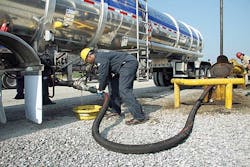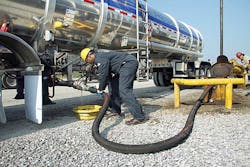Sun Coast finding refueling, crude hauling opportunities in the shale plays
It's hard to pinpoint exactly when Sun Coast Resources Inc began serving oilfield customers. The business developed gradually over several years.
However, the oilfield definitely has become a significant part of the company’s fuel and lubricants distribution business. In addition to steady demand for refueling and lube services for drilling rigs and fracking units, Sun Coast added crude hauling in 2011. The oilfield currently accounts for about 30% of the Houston, Texas-based company’s revenue.
“We are very pleased with the way our oilfield operations have developed, and we see plenty of opportunity for growth going forward,” says Kyle Lehne, Sun Coast vice-president and director of emergency response services. “We haul product for many of the major oilfield producers, and we also serve a lot of the smaller ones.
“Our oilfield activity started around 2003 after we opened our terminal and bulk plant in Fort Worth (Texas). We never made and conscious decision to be in the oilfield, but customers drilling in the Barnett shale play began calling for fuel deliveries. The calls just kept increasing, and we realized this was something we could do very well.
“Our oilfield customers need fuel delivered on time every day, because drilling and fracking operations go on around the clock. Customers also need their crude oil transported in a timely manner. We excel at providing this level of service.”
Oilfield expansion
Even when activity dropped abruptly in the Barnet shale play in 2009, Sun Coast continued to expand its operations in other oil and gas shale regions. Today, the company serves oilfield customers in a variety of oil and gas shale plays, including the Eagle Ford, Eagle Ford Bryan, Permian, Haynesville, Cline, Woodford, and Marcellus leasehold areas.
“We believe we are well positioned to expand our oilfield operations beyond those areas,” Lehne says. “We already have a few customers in the Bakken shale region in North Dakota.”
Sun Coast was the largest privately owned company on the Houston Business Journal’s 2013 Houston-Area Oilfield Equipment Supply and Services Companies. The fuel hauler and marketer ranked 19th on the list.
Products and services provided by Sun Coast to oilfield companies include, bulk fuel (primarily diesel), diesel exhaust fluid, bulk lubricants, fuel storage tanks, containment tanks, vacuum truck services, filtration and purification services, and condensate and crude oil hauling.
Experienced drivers
To serve the oilfield customers, Sun Coast draws from a pool of more than 1,000 experienced truck drivers with tank and hazardous materials endorsements. The company fleet includes 345 petroleum transports and 374 tankwagons, many of them configured for refueler service. Among the newest additions to the fleet are 149 crude oil/condensate transports.
Sun Coast has plenty of work for the vehicles assigned to the oilfield. The crude oil and condensate fleet currently serves upwards of 15 dedicated customers with more than 300 well sites and numerous gathering facilities. The crude transport fleet is hauling more than 37,000 barrels of product daily, which adds up to more than 10 million barrels a year.
“Our crude trucks ran 12 million miles in 2012 supporting our customers,” says TJ Walker, Sun Coast crude transport sales representative. “For some of the longer runs in Texas, we’re running relays to maximize productivity. We want to keep our trucks running 24 hours a day.”
Sun Coast’s refueling operation is just as busy. “A frack job could go through as much as 10,000 gallons of diesel a day,” Walker says. “We often have two refuelers on site for those operations. “We’ll deliver a transport-load of diesel every three days to our drilling rig customers. We do the refueling between frack stages or when the rigs are idle. We also do oil changes when the rigs are idle.”
Refueling drivers stay at the drilling site throughout a frack job. Sun Coast also has a supervisor at the rig site to coordinate activity make sure fuel shipments arrive on time.
“Our drivers really are specialists in oilfield refueling operations,” Walker says. “They are well trained in the specifics of the equipment they are refueling. These are not entry-level positions. Our drivers often go with the frack operator when the jobs move. We try to keep the teams together to ensure good, reliable customer service.”
Major marketer
Oilfield activity helped Sun Coast grow into one of the largest wholesale petroleum marketers in the nation. Annual revenues are approximately $2 billion. The company was founded by Kathy Lehne in 1985 and has grown to be the largest woman-owned business in Texas.
Sun Coast’s product line includes a wide array of petroleum products including gasoline, ultra low sulfur diesel fuel, marine diesel, jet fuel, avgas, kerosene and a full line of Chevron, Total, Conoco, Phillips 66, and Mystik lubrication products. As one of the largest Chevron lubrication marketers in the United States, Sun Coast is totally committed to “Quality Fuels & Lubricants.”
Sun Coast’s 1,000-vehicle fleet includes transports, bobtails, vacuum trucks, lube trucks, lowboys, pickups, and roll-backs for relocating tanks and equipment. In addition to the Houston headquarters location, the fleet operates out of 15 additional office and bulk plant facilities in Texas and Louisiana, located in close proximity to its large customer base.
The company also has a working inventory of more than 10,000 fuel and lubricant tanks used in support of its tank loan program, including skid mounted and overhead tanks, frack tanks, aviation certified tanks, lubricant tanks, and emergency ISO tanks.
Emergency fueling
Since setting up an emergency fueling division in 2004, Sun Coast has become one of the nation’s largest emergency fuel providers, specializing in generator and on-site fueling during times of peril. The company sent 177 trucks to the Northeast in October/November 2012 in response to Hurricane Sandy and it had refuelers on site following this spring’s devastating tornadoes in central Oklahoma.
“We set up the Emergency Fuel Service operation following a series of Florida hurricanes,” Lehne says. “We currently have close to 100 vehicles allocated to storm emergency response efforts.
“We believe it is important to continue serving our customers in even the worst storm or natural disaster. We know we are needed, and we want to be available.”
Members of the Special Operation teams that respond to natural disasters and other emergencies are veteran employees, who include drivers, driver managers, safety supervisors, trainers, and sales representatives. Team members—many of whom have commercial driver licenses—also participate in special campaigns and one-off jobs.
Sun Coast has a Mobile Field Command Center and a fleet of RVs for temporary housing during disaster response activities. The company provides fuel supply services and equipment to governmental agencies, utilities, communication companies, delivery services and other fleet operators when emergency situations such as hurricanes, floods, tornadoes and other severe weather conditions and related natural disasters create power interruptions, supply outages, or supply access restrictions.
Refueling trucks
The refuelers used for emergencies and the oilfield also serve a wide range of commercial accounts, power generation, construction and truck fleets, car dealerships, logging companies, farmers, and commercial fishermen.
“In commercial applications, we use the bobtails when a customer site can’t accommodate a transport,” Lehne says. “Typically, our bobtails handle up to seven deliveries a day, with deliveries ranging from 200 gallons to a full load.”
Tankwagons have capacities ranging from 4,500 to 5,000 gallons. Most of the tractor-trailer refuelers can hold up to 7,000 gallons. Tanks range from one to five compartments.
Refuelers may have up to four meters and hose reels, depending on application. The fleet uses Liquid Controls and Total Control Systems meters, Blackmer product pumps, Bayco and Civacon bottom loading adapters, Civacon overfill protection, Betts valves, and Allegheny tees.
Petroleum transport trailers also have up to five compartments and are specified with a 9,500-gallon capacity. Heil Trailer International has supplied a majority of the trailers.
Crude transports
Heil also was a supplier of the 149 crude oil trailers. Crude trailers also came from Dragon Manufacturing and Brenner Tank LLC. The trailers have a 200-barrel (8,400-gallon) capacity.
The double-conical DOT407 aluminum tanks were lined with epoxy to protect against corrosion. Tank hardware includes Garnet and Titan Logix level gauges, Scully overfill protection, Civacon bottom-loading adapters, and hydraulically powered Roper and Ranger product pumps.
“We specified the trailers to be able to handle other cargoes—such as methanol—when not in crude service,” Walker says.
Leased power
While Peterbilt is the primary truck supplier, Sun Coast recently added some Mack Pinnacle tractors. About half of the trucks across the entire fleet are leased from PacLease. All of the tractors in crude oil service are leased.
“We have been using leased power for a log time, and we have built a good partnership with PacLease,” Lehne says.
The daycab trucks are specified with Paccar’s MX engine and most have an Eaton 10-speed manual transmission. A few Allison automatic transmissions are used in certain applications.
Bendix roll stability is specified on new tractors. Some of the new trucks are being ordered with heavier-duty 46,000-lb-capacity air suspensions. Trucks have aluminum disc wheels, and the petroleum marketer Michelin and Bridgestone tires.
About the Author
Charles Wilson
Charles E. Wilson spent 31 years covering the tank truck, tank container, and storage terminal industries throughout North, South, and Central America as the editor of Bulk Transporter. Prior to 1989, Wilson was managing editor of Bulk Transporter and Refrigerated Transporter and associate editor of Trailer/Body Builders. Before joining the three publications in Houston TX, he wrote for various food industry trade publications in other parts of the country. Wilson has a bachelor's degree in journalism from the University of Kansas and served three years in the U.S. Army.

